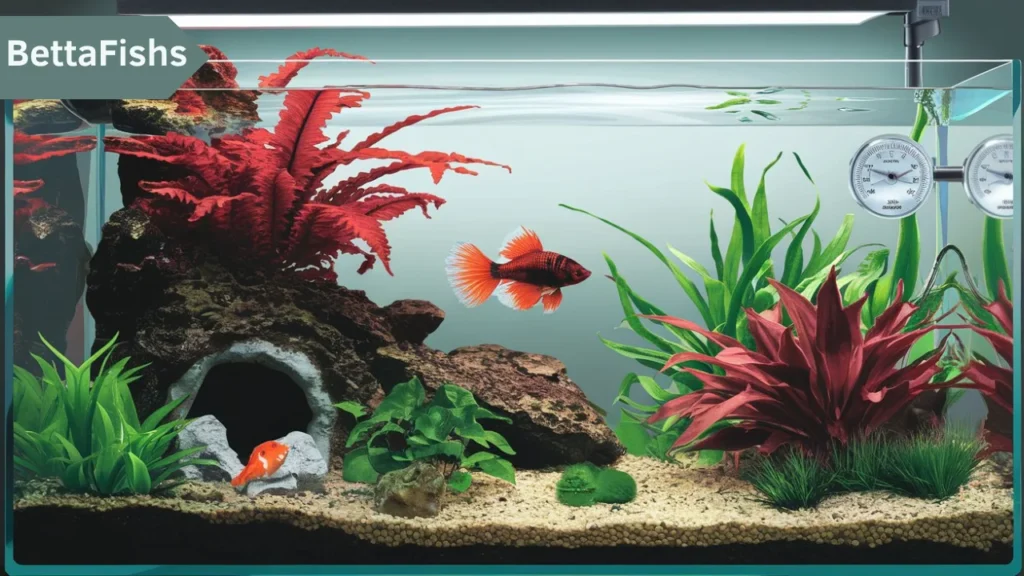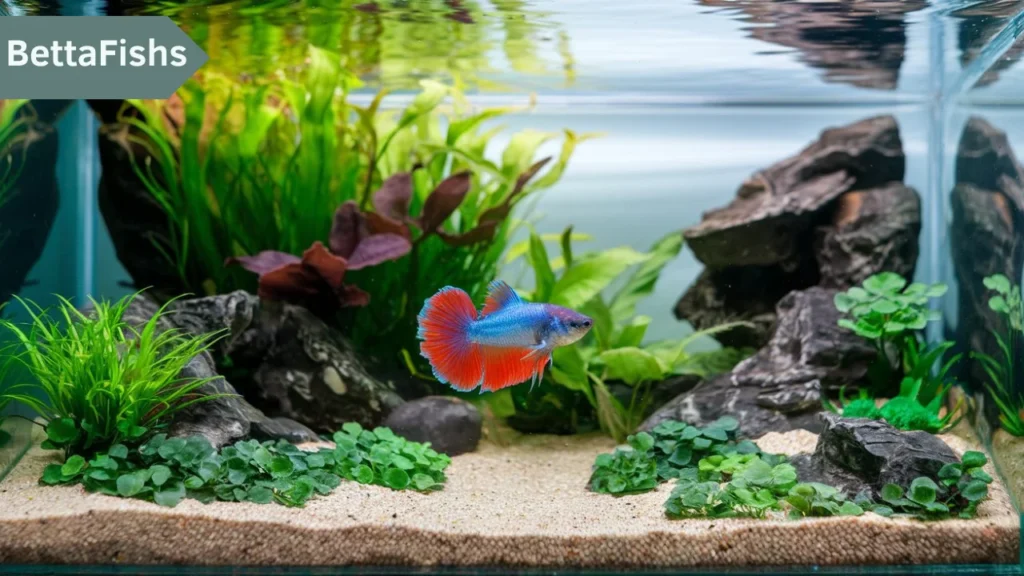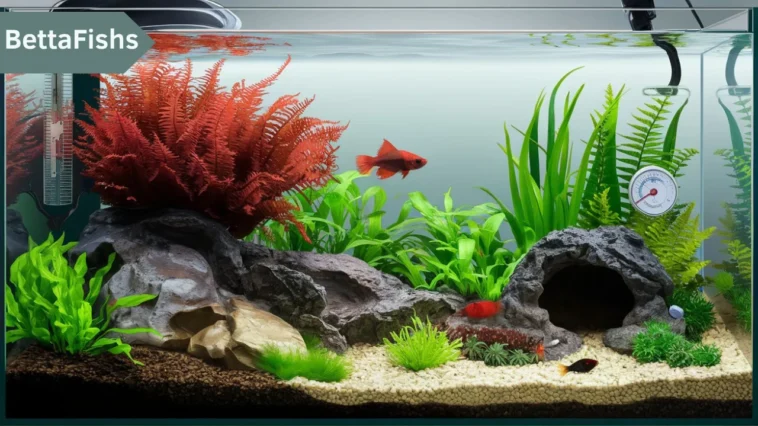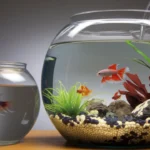Betta fish are one of the most popular pet fish worldwide, known for their vibrant colors and flowing fins. While many new betta owners might be tempted to keep these fish in small bowls or tiny tanks, the truth is that tank size plays a crucial role in the health and well-being of betta fish. So, ” What size tank does a Betta fish need? ” Let’s dive into the world of betta fish care and explore the best tank size for these beautiful creatures.
Betta Fish
Before choosing the right tank size, it’s essential to understand a bit about betta fish themselves. Betta fish, also known as Siamese fighting fish, are small, territorial fish originally found in the shallow waters of Southeast Asia. They are known for their aggressive nature, especially towards other males, and their unique ability to breathe air from the water surface using a specialized organ called the labyrinth organ.
Natural Habitat of Betta Fish
In the wild, betta fish live in rice paddies, slow-moving streams, and ponds, which provide ample space to swim and explore. These natural habitats are often lush with vegetation and provide plenty of hiding spots. Despite common beliefs, betta fish do not thrive in tiny puddles; they are accustomed to environments that allow for both movement and exploration.
Common Misconceptions About Betta Fish Care
A prevalent misconception is that betta fish are low-maintenance pets that can live happily in small bowls or cups. While betta fish are hardy and can survive in less-than-ideal conditions, this doesn’t mean they thrive there. Proper care, including the right tank size, is essential to keep a betta healthy and happy.
Why Tank Size Matters for Betta Fish
Tank size is more than just a matter of aesthetics; it directly affects the physical and psychological health of your betta fish.
Physical Health Benefits
A larger tank provides a better environment for exercise, reducing the risk of obesity and related health problems. It also ensures that bettas have enough space to display their natural behaviors, like swimming and exploring.
Psychological Well-Being
Betta fish are intelligent and curious creatures that need stimulation. A larger tank with plants, decorations, and hiding spots helps reduce stress and boredom, promoting mental health.
Water Quality and Maintenance Ease
Larger tanks are easier to maintain because they have more water volume, which dilutes toxins and provides a more stable environment. This helps in maintaining better water quality, which is crucial for the health of any fish.
The Minimum Tank Size for Betta Fish
So, what’s the minimum tank size for a betta fish? Most experts recommend a minimum of 5 gallons. This size allows enough space for a betta to swim freely and maintain proper water conditions. Anything smaller can lead to poor water quality, stress, and health issues.
Risks of Keeping Betta Fish in Smaller Tanks
Smaller tanks can quickly become toxic as waste accumulates, leading to ammonia spikes that can be lethal to bettas. Additionally, small tanks do not provide enough space for the fish to exercise, leading to lethargy and poor health.
Ideal Tank Size for Betta Fish
While 5 gallons is the minimum, the ideal tank size for a betta fish is closer to 10 gallons. A larger tank provides more room for swimming and enrichment, which can lead to a healthier and happier betta.
Benefits of Choosing a Larger Tank
A larger tank not only reduces stress but also allows for the inclusion of tank mates (if properly researched) and more decorations and plants, which can make for a more engaging environment for the betta.

Factors to Consider When Choosing a Tank Size
When deciding on the tank size, consider factors such as the activity level of your betta, whether you plan to keep tank mates, and the space available in your home.
Betta Fish Activity Level
Some betta fish are more active than others. If your betta likes to swim a lot, a larger tank will provide a more suitable environment.
Tank Mates and Community Living
If you plan to keep your betta with other fish, a larger tank is necessary to prevent aggression and ensure that all fish have enough space to thrive.
Common Myths About Betta Fish Tank Sizes
There are many myths surrounding betta fish and their care. One of the most common is that bettas can live happily in tiny bowls. This is far from the truth.
Debunking Myths About Small Bowls
Small bowls do not provide adequate space or water quality for a betta fish. They are prone to rapid temperature changes and do not allow for proper filtration.
The Truth About Betta Fish and Large Tanks
Contrary to popular belief, bettas do well in larger tanks. They are more active, healthier, and less stressed when provided with adequate space.
Tank Shape and Its Impact on Betta Fish
The shape of the tank also plays a role in the well-being of your betta fish. Tanks with more surface area are better for oxygen exchange, which is crucial for bettas, especially since they breathe from the water’s surface.
Preferred Tank Shapes for Betta Fish
Rectangular tanks are generally preferred over tall, narrow tanks. They provide more horizontal swimming space and better surface area for oxygen exchange.
Setting Up the Ideal Betta Fish Tank
Creating the perfect environment for your betta involves more than just choosing the right tank size.
Substrate Choices and Their Benefits
Choosing the right substrate, such as sand or gravel, can make a difference in the health of your tank. It should be easy to clean and safe for your betta.
Plants and Decorations for a Stimulating Environment
Live or silk plants and safe decorations can provide hiding spots and stimulation for your betta, mimicking their natural habitat.
Filtration and Heating Requirements
A filter is crucial for maintaining water quality, and a heater is necessary to keep the water temperature consistent, as bettas are tropical fish.
Maintaining Water Quality in Betta Tanks
Proper tank maintenance is essential to keep your betta healthy.
Importance of Regular Water Changes
Regular water changes help maintain water quality by removing toxins and waste.
Testing Water Parameters
Regular testing for ammonia, nitrites, nitrates, and pH levels is essential to ensure a healthy environment.
How to Prevent Common Water Quality Issues
Avoid overfeeding and ensure proper filtration to prevent common water quality problems.

Additional Tips for Betta Fish Tank Maintenance
Proper feeding, monitoring health, and recognizing signs of stress are key to maintaining a healthy betta.
Feeding Practices for Betta Fish
Betta fish thrive on a varied diet that includes high-quality pellets, and frozen or live food like bloodworms and brine shrimp.
Monitoring Betta Fish Health
Regularly check for signs of illness, such as changes in color, clamped fins, or lethargy.
Signs of Stress in Betta Fish and How to Address Them
Common signs of stress include fin clamping, color fading, and erratic swimming. Providing a larger tank and proper environment can help alleviate stress.
The Role of Tank Size in Betta Fish Lifespan
Tank size plays a crucial role in the lifespan of a betta fish. Bettas in larger tanks tend to live longer, healthier lives due to better water quality and a more stimulating environment.
Case Studies and Real-Life Examples
Many betta owners report longer lifespans and healthier fish when they upgrade to larger tanks.
Conclusion
In conclusion, the size of the tank you choose for your betta fish is more than just a matter of aesthetics or convenience; it’s about ensuring a healthy and happy life for your pet. A minimum of 5 gallons is recommended, but larger tanks, such as 10 gallons, are ideal. By providing a suitable environment, you’ll not only enhance your betta’s quality of life but also ensure they thrive for years to come.
FAQs
Can a betta fish live in a bowl?
While a betta fish can survive in a bowl, it’s not ideal. Bowls do not provide enough space or stable water conditions for a betta to thrive.
Do betta fish need a filter in their tank?
Yes, a filter is recommended to maintain water quality and reduce the buildup of harmful toxins.
How often should I clean a betta fish tank?
Regular partial water changes should be done weekly, and the tank should be fully cleaned every few months.
Can betta fish live with other fish?
Betta fish can live with certain species of fish, but tank mates should be chosen carefully to avoid aggression.
What is the best water temperature for a betta fish?
The ideal water temperature for a betta fish is between 76-82°F (24-28°C).





One Comment
Leave a ReplyOne Ping
Pingback:Betta fish water change schedule